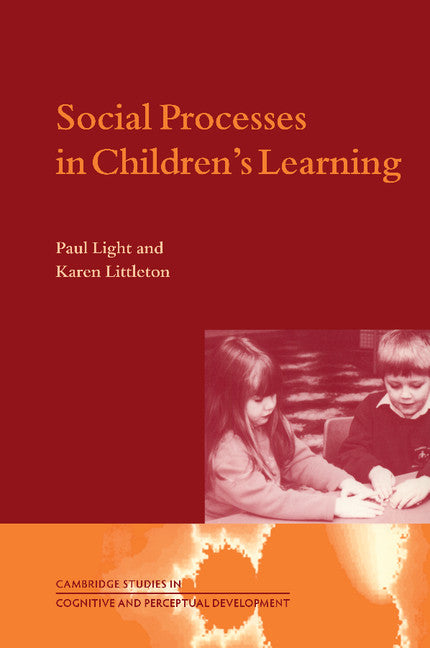Freshly Printed - allow 8 days lead
Couldn't load pickup availability
Social Processes in Children's Learning
This book, first published in 2000, is an investigation of the social processes of children's learning (including computer-based learning) and problem-solving behaviour.
Paul Light (Author), Karen Littleton (Author)
9780521596916, Cambridge University Press
Paperback, published 3 February 2000
142 pages
22.9 x 15.2 x 0.8 cm, 0.2 kg
"The studies presented and discussed have a gentle progession from the simple to the more complex, thus taking along the average reader. The material is compact and scholarly with helpful illustrations. It is well referenced and it is itself a very valuable reference on the impact of social interaction on learning in school age children." The Canadian Child and Adolescent Psychiatry Review
This book, first published in 2000, is about children's learning and problem-solving behaviour. It reflects the increasingly close integration seen in recent years between social and cognitive approaches to researching the learning process. In particular, Paul Light and Karen Littleton examine the ways in which interactions between children influence learning outcomes. They begin by placing this topic in a broad theoretical and empirical context and go on to present a substantial series of their own experimental studies, which focus on children of late primary and early secondary school age. These investigations address peer facilitation of problem solving, social comparison effects on learning and social context effects upon the interpretation of tasks. Many of the studies involve computer-based learning but the findings have implications both for classroom practice and the understanding of the learning process. This book will be a valuable tool for researchers, teachers and practitioners interested in the social processes of children's learning.
Dedication
List of figures
Preface
1. Peer interaction and learning: perspectives and starting points
2. Peers and puzzles: a first series of studies
3. Computers and learning
4. Pirates and honeymonsters: a second series of studies
5. Gender agendas
6. Social comparison and learning
7. Interaction and learning: rethinking the issues
References.
Subject Areas: Child & developmental psychology [JMC]


